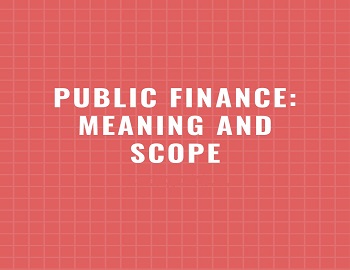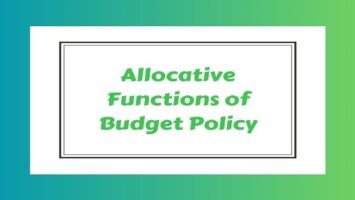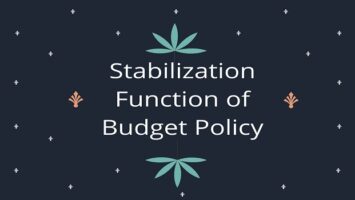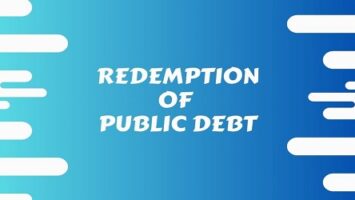Table of Contents
Public Finance:
Introduction:
The financing of government is a matter of universal concern, for practically everyone enjoys some advantages from the services of governments and also contributes to their support. Governments all over the world have entered and are entering into a great number of public projects, such as social security, protection, and other services of public utilities like railways, heavy-electrical, atomic energy, etc. The total expenditures and revenues of a government are much larger than the revenues and expenditures of a single man within the country. Again, not only the total public expenditure is very large, but it is increasing at a very rapid rate. And this gradual expansion of public expenditure is largely due to the expansion in the functions of modern governments. The methods of public finance have certain effects on economic life and can, therefore be used as instruments or means for bringing about desired social and economic changes.
Meaning of Public Finance:
Public finance deals with the income and expenditure of public authorities. The word public is used to signify the Government or State. Public authorities include all sorts of governments. Hence it can be said that it deals with the finances of the Government- Central, State, and Local- that are studied in the science of Public Finance. Prof. Dalton defined public finance as “It is concerned with the income and expenditure of public authorities and with the adjustment of one to other.”
Public Finance also deals with the problem of adjustments of income and expenditure of the government. The methods of expenditure of public bodies and the income of public bodies as well as borrowing by public bodies are known as operations of public finance. They are also known as fiscal operations, as they relate to the operations of the fiscal or public treasury. Hence, fiscal problems and fiscal policies are integral parts of public finance. The fiscal operations and fiscal policies have effects on the national production and income, the national standard of living, distribution of wealth and income, the money markets, etc., which in turn affect the economic life of the nation. And, therefore, every individual in the country is concerned with the methods of Public Finance.
Definitions of Public Finance:
Carl Plehn defined Public Finance as, “The science which deals with the activity of the statesman in obtaining and applying the material means necessary for fulfilling the proper functions to the state.”
According to Bastable, “Public Finance deals with expenditure and income of public authorities of the State and their mutual relation as also with the financial administration and control.”
According to George Findlay Shirras, “Public Finance is the study of the principles underlying the spending and raising of funds by public authorities. As a positive science, it is concerned with facts as they exist; it investigates the intricate flux of these financial events and discovers their hidden uniformities through patient and systematic inquiry which we call research, and the statements of uniformity are expressed as laws.”
Hugh Dalton defined Public Finance as, “It is concerned with the income and expenditure of public authorities, and with the adjustment of one to the other.”
According to H. L. Lutz, “Public Finance deals with the provision, custody, and disbursement of resources needed for the conduct of public or government function.”
Rolph and Break hold that “Public Finance may be defined as the discovery and the appraisal of the effects of government financial policies.”
Harold Groves describes it as, “A field of inquiry that treats the income and outgo of governments (federal, state, and local). In modern times, this includes four major divisions of public revenue, public expenditure, public debt, and certain problems of the fiscal system as a whole, such as fiscal administration and fiscal policy.”
According to Richard Musgrave, “Public Finance is an investigation into the principles of public economy, more precisely into those aspects of economic policy that arise in the operations of the public budget.”
According to Otto Eckstein, “Public Finance is the study of the affects of budgets on the economy, particularly the effects on the achievements of the major economic objectives- growth, stability, equity, and efficiency. It is also the study of ‘What ought to be’ ?”
As a matter of fact, in whatever words one may frame the definition but the substance of the above definitions is that public finance is that branch of economics that is concerned with the study of revenue and expenditure or the financial activities of the government. It also studies the theory of public debt, economic growth, stability in the distribution of resources, etc.
Scope and Importance of Public Finance:
The scope and importance of Public Finance can be discussed under three heads i.e.
- The Functions of the State.
- Fiscal Functions or Fiscal Operations.
- Subject-matter of Public Finance.
Functions of the State:
This classical economist with their faith in laissez-faire advocated minimum functions of the Government. Adam Smith, first systematically contributed a discussion on the duties of the State in the Wealth of Nations, published in 1776. According to Adam Smith, the “Duties of the Sovereign” fall into three classes:
- Defending the society from the violence and injustice of other independent societies.
- The second is that of securing internal justice between citizens.
- Smith defines his third duty as erecting and maintaining those public institutions…and works, which though they may be in the highest degree advantageous to a great society, could never repay the expense to any individual. Chief among such “works” he considers “those for facilitating the commerce of the society, and for promoting the instruction of the people.”
These are primary tasks for any government. It is almost impossible to conceive of any stable political system in which they are not recognized as fundamental. In modern times, Smith’s third duty would be described as expenditure for economic and social ends. It is remarkable that in the 18th century in England, Smith already envisaged the development of these two branches of public expenditure, which have now come to surpass all others in size and importance.
However, economists like Robert Owen and even John Stuart Mill (a follower of the Classical School) in England and Sismondi in France pointed out the effects of laissez-faire policy and advocated State action. Socialists in different countries advocated the socialization of means of production in one form or another to save the working class from exploitation by the existing system of the capitalistic economy. The severe depression of the thirties and the publication of Keyness– General Theory of Employment sounded the death knell of laissez-faire. Keyness demonstrated that it was possible through fiscal activities of the State to increase employment and to maintain it at a high level. Thus, the emphasis on state participation in economic life is continuously increasing.
The concept of the State and the function of the State are gradually changing. It is now universally agreed that the object of a State is to maximize the welfare of the community as a whole. Such a view of the State has, however, extended its functions, and it has to make provisions for medical facilities, education, poor relief and sanitation, and various other services of public utility, to increase the welfare of the community as a whole. Today, a modern State helps the people to raise their productive power by constructing infrastructure, i.e. railways, roads, power, post, telegraph, etc. It takes steps for reducing inequalities in the distribution of income, controls the production and distribution of scarce commodities, controls the prices of essential commodities, and takes steps to prevent or counteract inflation and depression. In times of war, it has to mobilize and control the entire resources of the nation to face it successfully.
Governments of advanced countries are committed to the maintenance of stable and expanding levels of employment and their goal is that the economy should function at the full employment level as far as possible. They are actively engaged in programs that increase national income and enable the economy to maintain continuous growth. In the case of underdeveloped or developing countries, the Government is committed to a program of accelerated economic development. Hence, it may plan the entire resources of the country. It is now obvious that the functions of the State in developed and under-developed or developing countries are continuously increasing with the increase in liabilities and responsibilities of Governments.
Functions of the Modern State:
The rise of modern states has been accompanied by an increase in the number of State functions and consequently the scope and importance of public finance. The functions of the State depend upon the stage of social development, for as society advances, new functions are undertaken. Hence, the scope and importance of public finance are also increasing with the development of the economy. However, the following services are provided by a modern state.
- Security, both external and internal and involves outlays for military, police, and other protective services.
- Justice, or the settlement of disputes.
- The regulation and control of an economic enterprise, including such services as coinage, weights, and measures, the regulation of business practices, and State ownership and operation of certain enterprises.
- The propagation of social and cultural welfare through education, social relief, social insurance, health control, and other activities.
- The regulation of moral standards through the control of traffic in drugs, the sale of alcohol, gambling, and other anti-social practices.
- The conservation of natural resources.
- The promotion of the unity of the State by such devices as the control of transportation and communication.
- The administration of the government’s financial system, expenditure, revenues, and fiscal control.
- The administration of government and the support of public officials.
- Occasionally religion and religious rights.
Therefore, to discharge these increased functions, the State has to increase its expenditure and to meet the expenditure, it has to mobilize and exploit funds with the help of methods laid down in the economics of public finance. Hnece, the scope and the importance of the study of public finance has considerably increased in modern times with the expansion of functions and responsibilities of the State.
Fiscal Functions or Fiscal Operations:
The following are the important fiscal functions of the Governments.
(A) Adjustment in Allocation of Resources- According to Prof. Musgrave, public finance deals with the economics of the public sector, since the market mechanism cannot perform all economic functions. It means all wants cannot be satisfied through the market mechanisms. Therefore, the public sector provided social wants or collective wants. The needs of the society are called “collective wants“, i.e. water supply, electricity, public health, education, railways, roadways, etc., besides the revenue and expenditure processes of the Government are used to divide the resources between private and social goods. It is also used to determine the proportion in which different social goods are produced. The provision is termed as allocation of resources.
(B) Adjustment in the Distribution of Income and Wealth- It means that the revenue and expenditure process of the Government may be used to reduce disparities in the distribution of income and wealth. Prof. Musgrave pointed out that among the various fiscal devices, redistribution may be implemented most directly through the following measures:
- A tax-transfer scheme, combining progressive income taxation of high-income households with a subsidy to low-income households.
- Progressive income taxes may be used to finance public services, especially those such as public housing which particularly benefit low-income households.
- A combination of taxes on goods purchased largely by high-income consumers and subsidies to other goods which are used chiefly by low-income consumers.
(C) Secure Economic Stabilization- The revenue and expenditure process of the government may be used to secure economic stability or to remove economic fluctuations and distortions in the economy. For Example-
- If there is full employment and price stability in the economy, then the existing level of taxes and public expenditure can be maintained to avoid economic fluctuations.
- To remove involuntary unemployment, effective demand should be stimulated by reducing taxes.
- To check inflation, public expenditure is curtailed and the level of taxation is enhanced.
(D) Accelerate Economic Development- One of the characteristics of developing countries is low per capita income. The reason is insufficient productive resources and inefficient utilization of such available resources. The market imperfections like immobility of factors, ignorance of market conditions, and price rigidity hinder economic development. Hence, the revenue and expenditure of the Government should be used to achieve economic development. When fiscal instruments are used to achieve such objectives, it is known as “Activating Finance“.
(E) Secure Distribution Justice- Wide disparities in the distribution of national income and wealth pose a serious problem, both economic and social in developing countries. Fiscal operations can be used to reduce the income of the rich and increase that of the poor. For instance, highly progressive taxes on higher incomes may prevent individuals from accumulating large wealth. Public expenditure on social security measures and poor relief increases the purchasing power of poor people. Besides, public expenditure on the education of the children of poor people may increase their earning capacity and make it possible to enjoy a better standard of living in the future. This process may reduce the gulf between the rich and the poor and lead to a more equitable distribution of income. Such fiscal operations may also benefit the community socially. For instance, equitable distribution of income reduces the concentration of economic power in the hand of the few and prevents the exploration of the poor by the rich.
Subject-matter of Public Finance:
Public finance is the science that deals with the income and expenditure of the government. In modern times, this includes four major sub-divisions i.e. public revenue, public expenditure, public debt, and certain problems of the fiscal system as a whole, such as financial administration.
- Public Revenue- The method of raising public revenue, principles of taxation, and other related problems are discussed and analyzed in this branch.
- Public Expenditure- This part of public finance deals with the study of the principles and the effects of public expenditure on the economic life of the country as a whole, i.e., the effect on production, distribution, and individuals.
- Public Debt- This part deals with the study of methods and causes of public borrowings.
- Financial Administration- The methods of administration, control, and problems relating to the preparation of a budget are studied and analyzed in this branch of public finance.
The scope and subject matter of public finance are not static but dynamic in the sense that it is continuously widening with the change in the concept of State, functions of State, and the changing problems of economics. For instance, the severe depression of the thirties and the publication of Keynes- General Theory of Employment, pointed out the importance of Fiscal operation in maintaining and achieving economic stability in an economy. The techniques of raising public income, public expenditure, and public borrowing are changing, the economic and social responsibilities of the State are increasing, and new problems of defense and public administration, etc., are growing. All these are the factors responsible for widening the scope of public finance.









Comments (No)